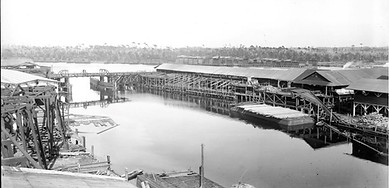Bagdad Living Com

Bagdad's Rich History

In 1828, Joseph Forsyth purchased a partially developed tract of land in Santa Rosa County from Juan de la Rua, a prominent Pensacola businessman. Forsyth partnered with Andrew and Ezekiel Simpson to further develop the site known as Arcadia into the first and largest Early American water-powered mill complex in Florida. Located on (Mill) Pond Creek, the series of mills included a saw mill, grist mill, shingle mill, cotton textile mill, and a bucket and pail factory.
In 1840, Forsyth built a new sawmill at the mouth of Pond Creek and Blackwater River. Inspired by the rivers, Forsyth called the area Bagdad. The Bagdad lumber mill was very prosperous, and later, both a shipyard and a sash and door factory were added.
For thousands of years indigenous people, known last as the Lower Creeks, occupied this area of the Gulf Coast. That changed by 1519 as Spanish explorers looking for new trade routes found and entered the (Pensacola) pass. By 1559, Spain set up its first colony. Since then, the area has transitioned from Spanish to British, then French, then back to Spanish occupation. Their occupation ended with the relinquishment of West Florida to the United States in 1822.

In 1845, Florida was admitted to the United States but withdrew from the Union in 1861. This brought much conflict and civil unrest to the region. As the first years of the Civil War began, the lumber mill and shipyards continued in their prosperity. A major Union advance occurred however, bringing about the withdrawal of Confederate troops from the area.
In 1862, all industry along the Blackwater River was destroyed by the Confederates during Beard's raid to prevent assets from falling into Union hands. As the mill in Bagdad was set ablaze, high winds carried sparks to the town and burned most of it down.
The Forsyth & Simpson partners had banked their fortunes in New York rather than investing in the Confederacy. This allowed them to quickly rebuild and become one of the largest producers of yellow pine lumber in the world. Unfortunately, the company failed to manage the forest and replant. Virtually none of the 30 million acres of virgin yellow pine was left in Northwest Florida after cutting its ample supply. By 1939, the mill in Bagdad went out of business causing most of the families to move away.
Bagdad might have disappeared as was the fates of many mill towns, but the need for housing grew at the start of WWII. Personnel and their families began to arrive at the naval installations of Pensacola Naval Air Station and Whiting, Saufley, and Corry Fields.

By 1941, Bagdad was again filled with families. Businesses also returned but their amount was low compared to the mill days. In 1987, the Village of Bagdad was listed on the National Register of Historic Places. Today, the community is committed to the restoration and preservation of natural, historical, and archaeological resources in and around Bagdad and the beautiful Blackwater River.

